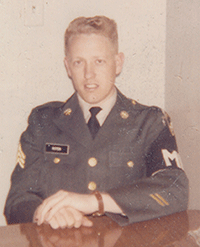Alabama Living readers recall where they were when President Kennedy was assassinated
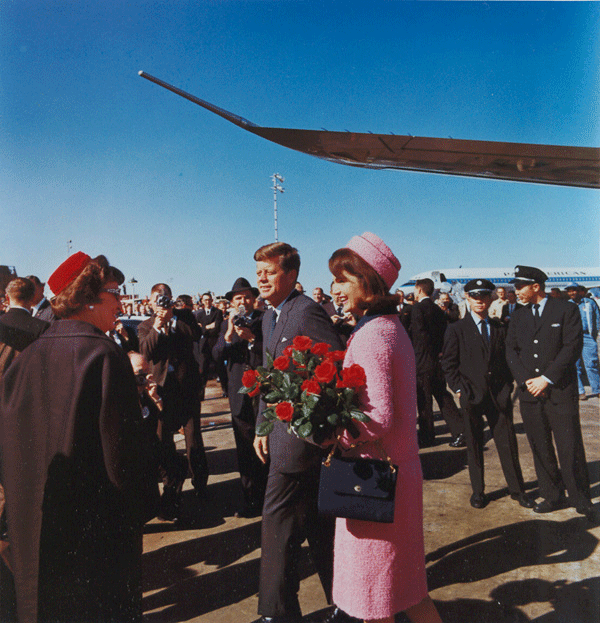 For those of us of a certain age (read Baby Boomers and earlier), Friday, November 22, 1963 is forever etched in our memory files. Many of us were in school, some were serving in the armed services, others were at their office, while others were simply at home. Like many of our readers, I was in school that day. We were finishing up a lesson in the sixth grade at Shades Cahaba Elementary School in Birmingham when our teacher, Mrs. Agnes Mason, was told to turn on the classroom TV. As we watched the events unfold in Dallas, she began to turn the horrific news reports into a teaching lesson, writing with precision the words “assassination,” “assassin,” and “President Kennedy,” on the chalkboard as she wiped away tears. The bell rang for recess, but I was too upset to go and instead remained inside to watch the TV with her. Maybe that was the beginning of my fascination with breaking news, as I would later become a newspaper reporter and editor. Like all of our readers who took the time to write, I will never forget that day. Thank you to all those who shared their memories with us. A selection of those submissions appears on the next four pages. Read more at alabamaliving.coop – Lenore Vickrey
For those of us of a certain age (read Baby Boomers and earlier), Friday, November 22, 1963 is forever etched in our memory files. Many of us were in school, some were serving in the armed services, others were at their office, while others were simply at home. Like many of our readers, I was in school that day. We were finishing up a lesson in the sixth grade at Shades Cahaba Elementary School in Birmingham when our teacher, Mrs. Agnes Mason, was told to turn on the classroom TV. As we watched the events unfold in Dallas, she began to turn the horrific news reports into a teaching lesson, writing with precision the words “assassination,” “assassin,” and “President Kennedy,” on the chalkboard as she wiped away tears. The bell rang for recess, but I was too upset to go and instead remained inside to watch the TV with her. Maybe that was the beginning of my fascination with breaking news, as I would later become a newspaper reporter and editor. Like all of our readers who took the time to write, I will never forget that day. Thank you to all those who shared their memories with us. A selection of those submissions appears on the next four pages. Read more at alabamaliving.coop – Lenore Vickrey
It was lunchtime on campus at Judson College in Marion, Ala. We walked toward town and all the while, the entire town was at a standstill as if in a time warp. No cars were moving, no one spoke, no noise could be heard, expect for the mournful wailing of church bells. It was, as if, for those moments, time was suspended and we were in a space between reality and a dream. November 22, 1963 was the day before my 19th birthday.
Patricia Noel Foster
Boaz
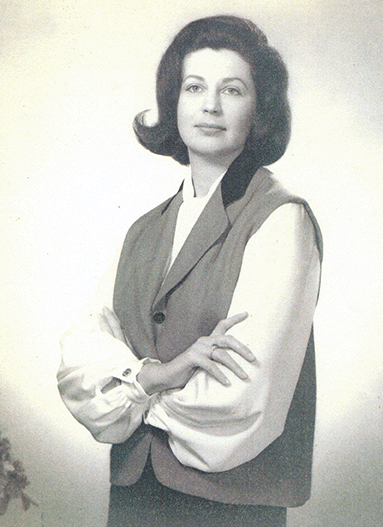 I was there in downtown Dallas as a single career girl walking along Elm Street from my studio to the parking garage to go to the hairdresser. There was to be a huge Crystal Charity Ball that weekend and I was going to get a fancy up-do for it. My date was flying in from California.
I was there in downtown Dallas as a single career girl walking along Elm Street from my studio to the parking garage to go to the hairdresser. There was to be a huge Crystal Charity Ball that weekend and I was going to get a fancy up-do for it. My date was flying in from California.
As the presidential motorcade approached, I hopped up on the bumper of a car so I could see above the crowd. Mrs. Kennedy waved back at me as the open car passed by. I continued on to my appointment in Highland Park Village.
When I walked in, the reception area was empty. I yoohooed. A frantic hairdresser rushed out of the rear and said, “Kennedy’s been shot.” I said, “You’re kidding.” “No ma’am, I’m not.” We scurried back where everyone was huddled around a radio. I had my hair done in silence with the radio blaring for all the customers to hear. I hurried home.
When my date called, we decided not to go to the ball and went to a married couple’s house to watch TV with friends.
En route to Dallas, my date had been seated next to Sandor Vanocur, a prominent television news commentator at the time, and my date’s brother was on the president’s staff at the White House, so all weekend my date was on the phone relaying first-hand information to the White House via local TV and Sandor Vanocur and vice versa – the death of our president at Parkland Hospital, the condition of our wounded Texas governor, John Connolly, the arrest of Lee Harvey Oswald and his murder by Jack Ruby, the swearing-in of Vice President Lyndon Johnson as president aboard Air Force One at Love Field with Mrs. Kennedy standing by her in blood-stained hot pink suit.
The ball went on as planned. We did not attend. My date for the weekend went home. I, and the rest of the nation, was numbed, horrified and exhausted. How could something like this happen in America?
My mother had died recently, so I moved back to Montgomery to take care of her parents who were 81 and 83, but the Kennedy assassination would reverberate in my life nearly a year later.
Knee-deep in wrapping paper and registering my wedding presents, I received a telephone call from a man from the Offi ce of Naval Intelligence who wanted to talk with me. Completely perplexed, I received the two dark-suited gentlemen in my living room. They wanted to know why and how my name was at the White House? I was even more perplexed. I told them about my date’s brother on the White House staff and about the weekend of Kennedy’s assassination. Also, I told them that I had been to the White House the summer of 1962 when I was the guest of the curator, Lorraine Pierce, who gave a friend and me a personal extensive tour of the White House while the Kennedys were at Hyannis Port. She was helping Mrs. Kennedy redecorate the White House. It was a memorable experience.
The two men left, but I was still perplexed. I could only presume that the interview with me was part of the Kennedy assassination investigation and that my name is somewhere in the Warren Commission report. I’ll never know.
Cameron Freeman Napier
Ramer
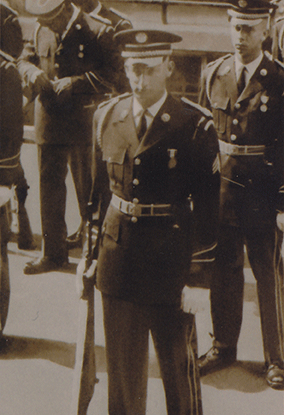 I was a senior in high school, visiting with my friend Lonnie James at a neighboring farm when he heard that President John F. Kennedy had been assassinated.
I was a senior in high school, visiting with my friend Lonnie James at a neighboring farm when he heard that President John F. Kennedy had been assassinated.
Not realizing what a tragic event this was, our main question was: Would school be out for a day or two?
Once I graduated from high school, I volunteered for the U.S. Army. In the spring of 1965 I was selected to serve in the Ceremonial Old Guard (Honor Guard) at Fort Meyers, Va. This army base joins Arlington Cemetery. I was a member of the Casket Team and was trained by offi cers and NCOs that had been part of President Kennedy’s funeral. Our duties included military funerals and other ceremonial events, not only at Arlington but throughout the U.S.
At that time, the monument for President Kennedy was being constructed. One of the duties I had was to stand in the area next to the Kennedy gravesite in my dress blues with highly polished shoes and serve as a historian about President Kennedy and the Kennedy family to the tourists.
I am sure many of the visitors were more knowledgeable of the events than the 19-year-old sergeant, a son of a farmer from Cullman, Ala.
Johnny R. Persall
Eva
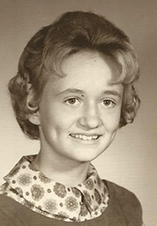 Mr. Wallace, Handley High’s principal, seldom made announcements over the intercom; therefore, when he cleared his throat before making an announcement that would forever change my opinion of history as a school subject, we all instantly felt a sense of aggravation that he was interrupting our busy chatter. Not two seconds after Mr. Wallace’s announcement that President Kennedy had been shot in Texas, we all fell silent. President? Shot? Might not live?
Mr. Wallace, Handley High’s principal, seldom made announcements over the intercom; therefore, when he cleared his throat before making an announcement that would forever change my opinion of history as a school subject, we all instantly felt a sense of aggravation that he was interrupting our busy chatter. Not two seconds after Mr. Wallace’s announcement that President Kennedy had been shot in Texas, we all fell silent. President? Shot? Might not live?
I honestly do not recall but assume we finished our school day without much knowledge of subject matter being relayed, but over the course of the weekend, my family and I became glued to our TV. We watched the funeral procession make its way to Arlington National Cemetery as millions lined the streets. Jacqueline Kennedy was so stoic yet tragically beautiful with Caroline and John John, a tender name given by the media, by her side. Although I was a mere 13 years old, I wept as John John saluted the deceased Commander in Chief. To this day, 50 years later, I am still haunted by his salute.
Linda Raughton
Adjunct English instructor, Northeast Alabama Community College
 On Friday, Nov. 22, 1963, I took a bus to downtown Dallas to my job as insurance underwriter at Reserve Life. At lunch, a friend and I walked several blocks to Main Street where the president’s motorcade would pass.
On Friday, Nov. 22, 1963, I took a bus to downtown Dallas to my job as insurance underwriter at Reserve Life. At lunch, a friend and I walked several blocks to Main Street where the president’s motorcade would pass.
We were standing on the curb expecting to get a good view, but as the limousine drew near, the crowded sidewalk emptied out into the street. Like a wave, people ran out to get near him and our view was blocked.
Disappointed, we started back to our office, but were stopped by a stranger who said the president has just been shot. Not knowing whether to believe her or not, we hurried on to our offi ce and learned he had died from gunshot wounds. This happened about three blocks from where he passed us.
Patsy Whitehead
Somerville
As I left school that day, I was picked up by my employer, friend and mentor, Ammie “Lulu” Morris, who was in the newspaper-selling business. He employed some two dozen boys like myself to sell the Ledger-Enquirer at Ft. Benning, Ga. As I got in the van that day he told me the paper was printing an early evening edition about the president being shot. We took those special editions to Fort Benning and in only a few minutes we sold out. I had never sold papers so fast or had so many soldiers in line to buy a paper at the mess halls. The young, eager and anxious faces of those troops still seem so real as I remember that day. This excited state would go on for days and we, the “paper truck boys,” would participate in a small way in the making of one sad historical day.
Jim “Sam” Tomblin
Opelika
I was a sergeant assigned to a military police company on an Army post in Arlington, Va. I heard the news on the radio while riding across the post of President John F. Kennedy being shot.
On the day of the funeral, I was in charge of a military police detail that was sent to Arlington cemetery to assist with crowd and traffic c control.
Master Sergeant Wyman Roten
Army Retired
Troy
In 1963 I was in my junior year at Auburn and a midshipman in the Naval ROTC. On that fateful day I was in a Naval ROTC class when the door opened and the senior chief petty officer of the detachment burst in. Before he said anything, we all knew something terrible had happened. This salty old chief had tears streaming down his face. He blurted out that President Kennedy had just been killed in Dallas. As we sat there in shock, he then reminded us that this week it was the Naval ROTC’s turn to raise and lower the US flag by Samford Hall. He asked for volunteers to go with him to put the flag at half-mast in mourning. As one, the entire class stood to their feet. He picked two other midshipmen and they left. The officer then dismissed all the rest of us. Some of my friends and I ran to the Student Union building to get to a TV where we stayed glued to the set while the news ran thru the events over and over. I learned that day and over the course the next few, that no one is indispensible as I watched LBJ being sworn in at the front of Air Force One while JFK’s casket was being loaded in the rear of the plane. Coincidentally my son was born on November 22, 1970, so I always have two memories of that day.
Steve Marcereau
Silas
I was sure that the world as we knew it was never going to be the same after that. Folks who before kept their front doors unlocked were now making sure that they were locked. Everyone was scared. It’s hard to believe that 50 years have passed since this tragedy.
Tom Davis
Dozier
On Friday the 22nd, I was sitting in class at the Washington School for Secretaries on F Street in the National Press Building. At 1:30 p.m. EST one of the teachers came to our class with the announcement that the president had been shot. This came over the ticker-tape machines in an Associated Press office on the upper level of our building. Within a few minutes another person came to the class to tell us he had died. Of course, we were all sent home for the day.
I was only about two blocks from the White House but did not have the presence of mind to walk over there. All I could think of was walking to the bus stop and getting home. It was a very warm day in DC for the end of November. The shopkeepers in the smaller shops along F Street had opened the doors to their shops and had placed small black and white TVs or small radios in their display windows. Some people were gathering around to listen to the latest news. In the streets not many were talking. It was an eerie sight.
When I finally got onto a bus to take me to the suburbs, people were either not talking or speaking in hushed tones. At home I did not want anything to eat. I remember tears in my eyes and being glued to our black and white TV. Saturday, Sunday and then the funeral on Monday – all my memories were of black and white images on the television. It was so strange to watch such a sad event and know that it was happening about 25 miles from where I lived.
The next day was Tuesday, Nov. 26. When I got in my first class, I noticed that the daily wall calendar still had the date of the 22nd. I pulled it off and saved it, took it home and started making a scrapbook of the events. The cover was black and glued to the front was the square piece of black and white calendar that had the number 22 on it. It was almost as if our world had changed in those five days and not any of us were the same again.
Sue Newell
Arab
My mother’s excitement of watching the motorcade in Dallas was the one thing I remember the most about that dreadful day. She passed that excitement to a five-year-old little girl who was more fascinated with the black and white TV screen in front of her than what was to take place. Although I could not fathom the impact of the scene that played out before me, I knew by my mother’s gasp and her hand clamped over her mouth that something terrible had happened. When my questions started pouring out of my my mouth, her response, “Hush child, something awful just happened,” wasn’t just a warning to me, but it sent a cold chill through me. She turned the volume on the TV up louder and adjusted the rabbit ear antenna on top to get a clearer picture, but nothing she did could undo what had just happened.
My family and I watched with sadness as the little boy named John and the little girl named Caroline said goodbye to their father. That year on Nov. 27 my mother bought two birthday cards, one for me and one for Caroline. Although a year younger, I was born on Caroline’s birthday. Each year I think of her and wonder if she ever received the card I sent with the innocent message my mother wrote, “I’m sorry your Daddy died and I know you miss him. We all loved him. Happy birthday.”
Sonya Walls Knowles
Dothan
We had just moved to Texas from Alabama where Dad had started a new job. We lived in the outskirts of Garland, on the edge of city limits between Garland and Dallas. On that November day, I was riding my bicycle to the country store. The sky filled with helicopters and airplanes were everywhere. I thought a war had started. I rode home as fast as I could and when I got home Mom had the old black and white TV on. President John F. Kennedy had been killed in Dallas. Mom was crying so I started to cry, so I ran to my room. We had all felt like we had lost a very good friend.
Frank Armstrong
Section
It was a typical November day at my high school in Glencoe, Ala. Students were laughing, changing classes, lockers were slamming, lovebirds were standing too close and whispering. The bell rang, signaling everyone to go to their next class. Mine was Glee Club. We were a few songs into our session and the next song to sing was “Now is the Hour.” The lyrics are, “Now is the hour when we must say goodbye. Soon you’ll be sailing far across the sea.” We were no more than a few more words into that song when a student threw open the double doors and shouted, “The president has been killed.” The music teacher left us to confirm the horrible news. Sadness filled the big lunchroom. Some cried, some still doubted, others were angry. I myself felt empty. The hour had come for the greatest and most powerful man in our country. I don’t think I ever sang that song again.
Priscilla Carroll
Albertville
I was a high school junior in Bethesda, Md. Living so close to our nation’s capital, I had friends and classmates whose parents worked in the Kennedy administration. The father of one of my classmates was a Secret Service agent who was riding in the president’s limousine that day.
Three hours after the news broke, I recorded my thoughts in pencil on notebook paper. Years later, I transcribed those thoughts so they could be published in The Jefferson Davis High School newspaper for my students to read:
…I fought to blink back tears and prayed with all my strength, over and over, every prayer I knew. The substitute teacher began to counsel us and remind the class that “even though hard times may be ahead we must have courage.” After five minutes of listening to her gab and desperately scribbling down my French to get it finished while I could still see the paper, the PA came on again. This time it was the deep voice of Dr. Patten: “I hate to be the one to tell you this,” he said. “The President has been assassinated.” I began to cry… the young college student teacher forgot to be brave and joined the girls in tears. The boys couldn’t cry, they just sat, pale and shaken.
The bell finally rang and we filed into the hall. The corridors were strangely silent. Hundreds of people walked past me as dazed as I was. I saw several of my friends. We passed without speaking. At gym class, the hockey game was the most eerie sight I’ve ever seen. They fought extra hard over that seemingly inconsequential ball, all without making any noise.
At 3, all I remembered while going down the hall were words like “assassinate,” “Lincoln,” “vice president” and most commonly, “Oh, God.” Lockers slammed extra hard. No one dallied in the halls. I just wanted to go home, listen to the news and find out the time of church services.
Thanksgiving is a week away.
Carol Hoff Alford
Montgomery
I was a brash, 18-year-old freshman enrolled at Hinds Community College. The stoplight was red. I was in my ’55 Chevy at the intersection of Springridge Road and Highway 80 across from Mississippi College in Clinton, Miss. The song on the AM radio was “Runaway” by Del Shannon.
Suddenly, the radio blared President Kennedy has been shot! My fi rst thought was “Great, they finally got him.” I have no idea who “they” may have been. The day changed my generation forever. My immediate reaction was elation, the same as that of my friends. Feelings toward President Kennedy, for the most part among southern whites were negative. Forced integration was not wanted, nor understood by many young white American youths living in the Deep South. In retrospect integration was the correct move, at the right time, for the future health and welfare of our nation.
As I write today at age 68, refl ecting on this moment, only feelings of deep sadness and shame come forth. Life is a vapor. Who am I to celebrate the president’s impending death by assassination? It does no good to hate or detest anyone. Ezekiel 18:32 says, “For I take no pleasure in the death of anyone, declares the Sovereign Lord.”
Gary Stone, Ed.D.
Professor Emeritus, University of West Alabama
Without being told to or asked to, I walked past my classroom door, down the corridor and out to the front of the school. I untied the American flag from the lanyard cleat and lowered it to half-staff as I had learned as a Boy Scout. I took a step back, looked up and saluted. I can’t be sure, but I suppose some people driving along Ventura Boulevard (in Los Angeles) first knew that JFK was killed by seeing that flag at half-staff.
Bruce Murphy
Montgomery
I was working in the construction office of the Guntersville Lock and Dam and hydroelectric site on the north side of the Tennessee River across from Guntersville and Arab… Sometime that afternoon someone in the accounting or payroll office who had a radio called us and told us that President Kennedy had been shot. A little later, they called back and said the president was dead. That was a sad day. We had not lived through anything like that. After several years of a bad economy and hard times, President Kennedy had brought new hope and prosperity to the country but it had ended too soon.
Robert Elliott
Winfield
I was in gym in P.E. class when over the intercom the shaky voice of our high school principal announced the death of our beloved president. At first silence, but then crying could be heard. My heart was pounding in fear of maybe a war starting against us and no one to protect our nation. These were the thoughts of a 14-year old. I loved the president and was in shock.
I guess it really hit me hard because my mom had just died of cancer 25 days before the loss of my president, two people who were close to my heart. I still buy anything written on John F. Kennedy that I can.
Carolyn Tucker Sparkman
Hartselle
I was 36 and had just settled back in after lunch as a civilian at Patrick AFB in Florida. I was anxious to hear from my husband, James “Shorty” Brackin who was stationed at the base with the US Navy. He was to pick up the film he had made with our home movie camera just six days earlier; live film of our beloved President John F. Kennedy aboard the USS Observation Island. The commanding officer had invited my husband to board the surface missile-firing ship the previous Saturday morning to witness the president’s visit. He was so excited and had brought his 8mm movie camera aboard in hopes he could sneak a little footage.
My office phone rang and my husband told me he had picked up the film but heard some shocking news at the PX; President Kennedy had been killed. About that time, people started buzzing through both our offices, horrified by the news. The base was closed as were all schools. We picked up our three children and headed home, saddened and in disbelief. For the next few days we didn’t go anywhere and kept the television on, trying to make sense of it all.
The film proved to be a great comfort as we watched it over and over that day and the next few days. Our commander in chief dearly loved the space program and we did, too. The film shows the USS Observation Island anchored a few miles out to sea. Then President Kennedy flies in via helicopter and lands on board. He exits the helicopter and is presented with a Navy jacket and binoculars. A submarine fires a missile and the missile can be seen coming up out of the water into the air. The president is returned to the helicopter and after all the salutes, the helicopter takes off. This visit was not publicized, so I doubt there is much of any other footage of this particular visit. I am now 86 and I still get chills when I watch this home film. It brings back the emotions my husband and I felt on Nov. 22, 1963 as we watched it for the first time… the shock, horror and sadness for the loss of our president and the fear we felt for our beloved country, military and space program.
Dorothy “Dot” Brackin
Webb
Our office (in San Antonio, Texas) closed early…it was as if a close family member had been murdered and we all had to grieve and scream, cry, be angry. I recall crying as I watched TV that evening…not wanting to miss one second of what would be “history”…I cried myself to sleep all curled up on the sofa.
Linda Williams
Gulf Shores
I was living in Dallas, Texas and was downtown with my lawyer on business. Whe he left, I decided to stay and see the President and Mrs. Kennedy and Gov. and Mrs. Connolly. I stood close to the corner of Houston and Elm streets in front of the city jail. It was here where the presidential motorcade would turn to go past the school book depository building and on to lunch at one of the hotels.
Moments later, there were gunshots and everyone started running and screaming as if there were a bomb scare. A group of us stood across the street from the depository building. There were about five policemen standing around the building with their rifles pointed up toward the 5th floor. Soon, two plainclothes men came out of the building with a man between the two of them. He was wearing a trench coat and horn-rimmed glasses. Thinking he was the one who fired the shots, the crowd became belligerent, screaming, cursing, throwing things. Needless to say he was not Lee Harvey Oswald, but I never learned who he was.
Although this was a tragedy that should not have happened in our lifetime, I feel fortunate to have been there. It was a day I will never forget.
JoAnn Clark
Clanton
